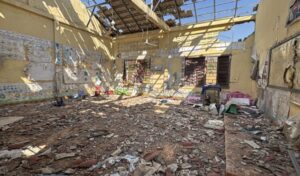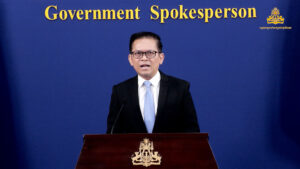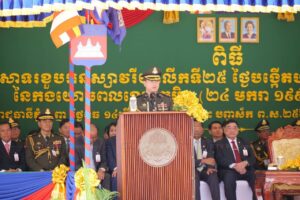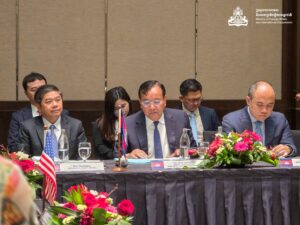Remarks By H.E. Kitti Tesaphibal Bindit HUN MANET Introducing the “Pentagonal Strategy–Phase I” and the “Key Measures of the Royal Government for the Seventh Legislature of the National Assembly” at the First Plenary Session of the Council of Ministers for the Seventh Legislature of the National Assembly
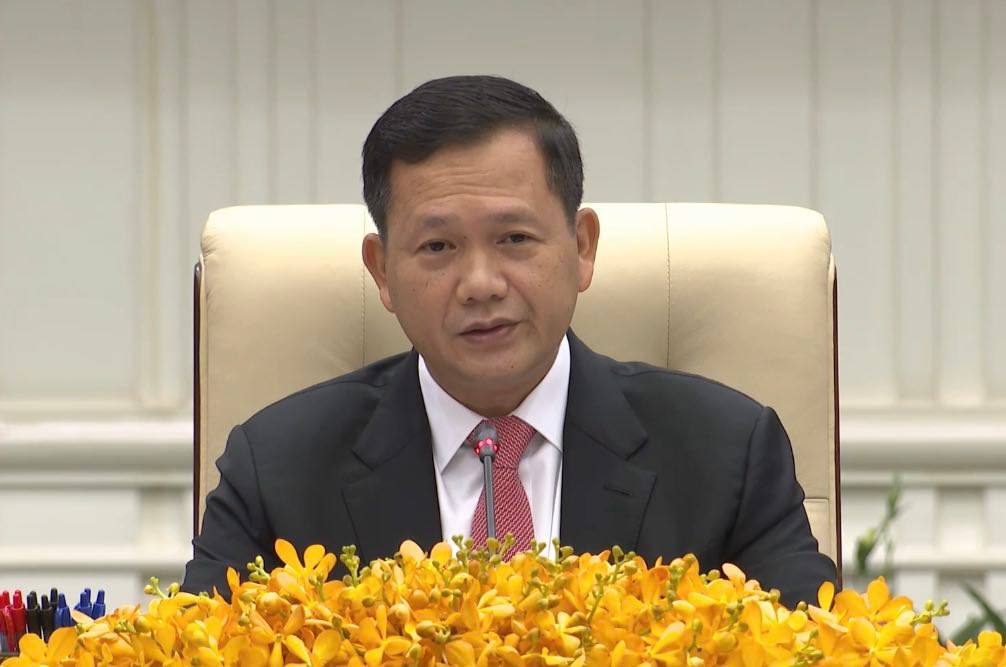 Remarks By H.E. Kitti Tesaphibal Bindit HUN MANET Introducing the “Pentagonal Strategy–Phase I” and the “Key Measures of the Royal Government for the Seventh Legislature of the National Assembly” at the First Plenary Session of the Council of Ministers for the Seventh Legislature of the National Assembly
Remarks By H.E. Kitti Tesaphibal Bindit HUN MANET Introducing the “Pentagonal Strategy–Phase I” and the “Key Measures of the Royal Government for the Seventh Legislature of the National Assembly” at the First Plenary Session of the Council of Ministers for the Seventh Legislature of the National Assembly
Remarks By H.E. Kitti Tesaphibal Bindit HUN MANET Prime Minister of the Kingdom of Cambodia Introducing the “Pentagonal Strategy–Phase I” and the “Key Measures of the Royal Government for the Seventh Legislature of the National Assembly” at the First Plenary Session of the Council of Ministers for the Seventh Legislature of the National Assembly
Peace Palace, 24th August 2023
——–
- Excellencies Deputy Prime Ministers, Senior Ministers, Ministers, and Members of the Council of Ministers!
Today is a historic day that I am most honored and pleased to take upon the opportunity of our First Plenary Session of the Council of Ministers to announce to the Cambodian people and all stakeholders the key policy priorities and the unwavering commitment of the Royal Government Cambodia (RGC) of the Seventh Legislature to continue implementing key reform programs in all areas, aiming to serve our national interests and to respond to our people’s needs and requests.
Based on the Cambodian People’s Party’s (CPP) “Political Platform for Nation Building and Defense 2023-2028” that received overwhelming supports from citizens across the country as reflected in the 23rd July Election, the RGC has prepared its “Political Platform” for the Seventh Legislature of the National Assembly. Based on a comprehensive review of past achievements from the previous Legislatures, the current and future national and international contexts, and the need to respond to our people’s aspiration, this “Political Platform” has set the strategic goals, major priority policies, sectoral development policies, and the priority policy programs that will be implemented from 2023. All of which are frameworks for the RGC to continue serving the nation and the people in this Seventh Legislature. As the Prime Minister of the Kingdom of Cambodia, I have presented this “Political Platform” to the National Assembly, and to the Cambodian people through the National Assembly.
Based on this “Political Platform”, the RGC has also prepared the “Pentagonal Strategy-Phase I” for Growth, Employment, Equity, Efficiency and Sustainability: Building the Foundation Towards Realizing the Cambodia Vision 2050, as the socio- economic policy agendas to effectively implement the “Political Platform”. It will also serve as a guide to direct activities of all stakeholders to continue maintaining the momentum of peace and the accumulation of the past achievements, as well as the building of foundations to achieve accelerated development in the medium and long terms through targeted reforms across all areas. I would like to take this precious opportunity to submit the “Pentagonal Strategy-Phase I” to our First Plenary Session of the Council of Ministers, development partners, stakeholders, and the Cambodian people everywhere, to be informed of this strategy, as well as to jointly collaborate in implementing this strategy, just as what our Cambodian voters have anticipated.
Due to the length of this Pentagonal Strategy-Phase I, I will not read the full text. Instead, I will briefly introduce the main contents of this Pentagonal Strategy-Phase I. Nevertheless, as Excellencies, Ladies and Gentlemen may have noticed right in front of you, the full text of this Strategy has already been compiled into a book-both in Khmer and in English, and has been distributed to every member of this Plenary Session. In addition, after this Session, I would like to request the Office of the Council of Ministers to post this document on the RGC’s official website, to allow all stakeholders and the general public to download in soft copy or print out in hard copy as needed. At the same time, I would also like to request the Supreme National Economic Council (SNEC) to print copies of this document to distribute to relevant ministries-institutions and development partners as needed.
As stated earlier, I would like to begin a brief introduction of the main contents of the “Pentagonal Strategy-Phase I” as follows:
1. Background
Over the last 25 years, since achieving full peace, national unity, and territorial integrity through the Win-Win Policy of Samdech Akka Moha Sena Padei Techo HUN SEN, the RGC successfully implemented the Triangular Strategy and the Rectangular Strategy in four distinct phases, with major achievements in all areas, including politics, society, and economy, enabling Cambodia to proudly renew its image.
In fact, once war-torn, and known as a killing field, an insecure area and a dreaded minefield, Cambodia has emerged as a peaceful and independent sovereign state with rule of law and political stability, in accordance with the principles of liberal multi-party democracy under the blessings of the Most Revered His Majesty the King. Once politically and economically embargoed and isolated, Cambodia is now fully integrated into regional and global structures and architectures, and has played an important role in maintaining global order, as well as safeguarding the world peace. Millions of Cambodian people have been lifted out of poverty, enjoying decent livelihoods, being educated, and enjoying better welfare and significantly increased life expectancy.
Cambodia’s economic base has shifted from the one that relied almost entirely on traditional agriculture to the one with a broad and robust economic base, which is attractive to new and high value-added industries. Once plagued by chronic cash shortage crisis and relying almost entirely on international aids for survival, the country now enjoys full financial autonomy and ownership in determining its fate and future. The tangible and intangible Khmer cultural heritage that was stolen, lost, or damaged during the war, is now being revived and restored as national and world heritage, and being recognized and returned to their motherland. In addition, recent major achievements of the RGC-such as the successful management of the COVID-19 pandemic; its success in assuming the ASEAN chairmanship for the third time in its history, and the physical hosting of the ASEAN Summits and Related Summits in the immediate aftermath of the COVID-19 crisis; as well as its success in hosting the 32nd Southeast Asian Games and the 12th ASEAN Para Games- are also among the undeniable proofs of Cambodia’s proud progress.
Overall, the Triangular Strategy and the Four-Phase Rectangular Strategy have played a prominent role as Cambodia’s Socio-Economic Development Policy Agenda. They have provided a common framework for building a strong and independent state institution, whose governance systems are regularly modernized to be more comprehensive, resilient, and efficient; and a framework for the rapid socio-economic development that is recognized by both the region and the world. These Strategies have been especially instrumental in transforming Cambodia into a lower middle-income country in a short period of time, with high economic growth and rapid poverty reduction, as well as successful regional and global integration.
The commendable successes aforementioned are the results of the RGC’s resolute efforts to put national and public interests above all else and to implement regular reforms with the support from development partners and stakeholders, as well as active participation of the people from all walks of life. These efforts and participation have also laid a solid foundation for Cambodia to firmly maintain peace and political stability, strengthen its ownership over the nation’s destiny, and promote prosperity for its people to these days.
Now, Cambodia’s nation-building process is entering a new phase in an increasingly changing, difficult and uncertain world. Cambodia will face new challenges in its endeavors to transition to a high-income country and regularly need to adapt to changing global trends. These challenges require a strong focus on enhancing leadership and institutional capacity at all levels, as well as ensuring sound policies, practical implementation capacity, results, and accountability.
On this basis, consideration on the next phases of socio-economic development agenda shall focus on achieving the Cambodia Vision 2050, building on the experiences and achievements of the past 25 years and the assessments of the next 25 years, by formulating strategies for step-by-step implementation. In the past, the Triangular Strategy and the Four-Phase Rectangular Strategy can be considered as a cycle of nation- building that focused on restoring and rebuilding the country in the post-war period, maintaining peace and social order, integrating into regional and global structures and architectures, developing and maintaining socio-economic stability, and improving people’s livelihoods. The next 25 years will be a new cycle for Cambodia, and the cou aspires to take its national pride to new heights as it did during the Angkor era building a nation that is strong, vital, glorious, and prosperous towards a high-inc country by 2050.
2. Rationale for the Formulation of the Pentagonal Strategy
Based on the stocktaking of the achievements over the past 25 years, the assessments of regional and global trends, and prognostications for the next 25 years, the objective has been set towards realizing the Cambodia Vision 2050 to meet people’s aspirations. In this spirit, the RGC adopts the “Pentagonal Strategy” to boost growth, create jobs, ensure equity, increase efficiency, and maintain sustainability. Overall, the Pentagonal Strategy is a forward-looking strategy for the next 25 years, which has been planned to be set out and implemented in 5 successive phases, and aligning with the Political Platform of the RGC for each Legislature of the National Assembly. Each phase will be adjusted based on the actual context of the country, the region, and the world, as well as the experiences resulted from the implementation of the previous phases, along with the aspiration towards achieving its nation-building, particularly the Cambodia Vision 2050.
Within the aforementioned consideration, for the first 5 years which is the Seventh Legislature of the National Assembly, the RGC adopts the Pentagonal Strategy-Phase I for Growth, Employment, Equity, Efficiency, and Sustainability, based on practical needs in the following key aspects:
1. The need to continue strengthening and expanding the achievements that the RGC achieved in the past Legislatures within the frameworks of the Triangular Strategy and the Four-Phase Rectangular Strategy, by protecting and continuing to strengthen peace, political stability, and public order, strengthening respect for the rule of law, rights and freedoms, people’s dignity, and liberal multi-party democracy; implementing the practical measures aimed at improving the living standards and well-being of the people; and especially, resolving the issues related to the effectiveness of governance, institutions and social justice, as well as enhancing integrity and quality of public services.
2. The need to continue the reforms of institutions and governance to realize a public administration with high competency, strengths, intelligence, and integrity; work in accordance with the approach of the Dynamics of Stakeholder System; as well as to ensure high efficiency in all aspects of operations including leading, coordinating, monitoring and evaluating the implementation of policies and strategies, in the contexts of the rapidly changing socio-economic situation, both at home and abroad.
3. The need to continue laying and strengthening the foundations for promoting socio-economic development with emphasis on building strong human capital, especially through the reforms of education and health sectors; increasing economic productivity; enhancing people’s knowledge and workers’ skills; strengthening corporate governance of the private sector and businesses; and promoting connectivity and development of soft, hard, and digital infrastructures, in order to create a new growth model based on skills, technology, and innovation.
4. The need to enhance Cambodia’s economic diversification and competitiveness to build resilience to changes in socio-economic and natural environmental factors, to strengthen the foundation for economic growth and ensure sustained high growth through increasing value-added in the existing drivers for economic growth and other pote sectors; promoting investment in agricultural and agro-industry sectors; promog industrial development and industrialization; promoting fair competition and enhancing Cambodia’s competitiveness; building resilience to emergencies and crises; and also promoting international relations and diplomacy and deepening regional and global integration, aimed at maximizing social-economic benefits for the nation.
5. The need to launch a comprehensive Socio-Economic Policy Agenda of the Political Platform of the Royal Government of the Seventh Legislature of the National Assembly to build a strong foundation to continue the path towards realizing the Cambodia vision 2050.
3. The Strategy’s Mission and Its Implementation’s Approaches
The Pentagonal Strategy-Phase I for Growth, Employment, Equity, Efficiency, and Sustainability has two key historical missions: first, to safeguard and nurture peace that is hard-won through invaluable sacrifices while promoting economic growth and overall development; and second, to build and strengthen the foundations to accelerate national development to achieve the milestone of becoming an upper middle-income country by 2030, and subsequently move forward to achieve the Cambodia Vision 2050 through strengthening the resilience of the five sectors, namely public sector, economic sector, financial sector, human and social capital sector, and environment sector and climate change response.
The Pentagonal Strategy-Phase I shall be implemented, in accordance with the approach of Dynamics of Stakeholder System, requiring all ministries-institutions under the RGC, both national and sub-national, to work together in an energetic collaboration and coordination, with synergy and complementarity, as well as flexibility to changes of realities to achieve the set priority objectives.
4. Mottos, Strategic Objectives and Key Priorities of the Strategy
The Pentagonal Strategy-Phase I has Five Mottos, Five Strategic Objectives, and Five Key Priorities.
Five Mottos include: Growth, Employment, Equity, Efficiency, and Sustainability
Five Strategic Objectives include:
(1). Ensuring crisis-resilient economic growth of around 7% per year on average;
(2). Creating more jobs, both quantity and quality, for Cambodian people, especially for the youth;
(3). Achieving the poverty reduction targeting of below 10% and continuing to keep the poverty rate to a minimum level;
(4). Continuing to strengthen governance capacity and improving the quality of public institutions, both national and sub-national, to ensure efficiency of public services, continue to strengthen private sector governance, and continue to promote a favorable environment for business, investment, and trade;
(5). Ensuring sustainable socio-economic development and building resilience to climate change.
With Five Mottos and Five Strategic Objectives as stated above, the RGC ident Five Key Priorities for the Pentagonal Strategy-Phase I, namely People, Road, Water, Electricity, and Technology that are clearly reflected in the Strategic Pentagons in the whole structure of the strategy.
5. Structure and Summary of the Strategy
Overall, the structure of the Pentagonal Strategy-Phase I has (1). Core of the Strategy: to reform and strengthen governance, (2). Overarching Environment: to ensure a conducive environment for the implementation of the entire strategy, and (3). Five Strategic Pentagons: to promote economic growth and social progress.
Core of the Strategy, Overarching Environment and Strategic Pentagons are comparable to production function where the implementation of inter-connected measures will lead to the increase in aggregate economic productivity, labor productivity and investment, as well as the efficiency of investment in economic capital. Aggregate productivity will be increased through combined measures that are reflected in the Core of the Strategy focusing on institutional reforms, and strengthening of institutional capacity, and in the Overarching Environment which focuses on creating favorable environment for socio-economic development. Labor and capital productivity will be enhanced through the Five Strategic Pentagons, which includes 1) human capital development; 2) economic diversification and competitiveness enhancement; 3) development of private sector and employment; 4) resilient, sustainable, and inclusive development; and 5) development of digital economy and society.
The Core of the Strategy focuses on governance and institutional modernization of state institutions to become modern, competent, strong, smart and clean, through which political, economic, and administrative power can be exercised to govern and manage the national affairs, particularly to ensure the continuity of the roles and functions of the public administration, in line with people-centric interests, nation-state building, and the strengthening of the rule of law, aimed at supporting sustainable and inclusive social- economic development. In this context, the RGC continues to focus on five priorities as follows:
(1). Institutional reform and strengthening with strategic objectives, focusing on building a highly competent, strong, smart, and clean public administration to serve the best interest of people;
(2). Improvements of human resources and work efficiency with strategic objectives, focusing on building competent and skilled human resources with a high sense of professionalism, ethical standards, and ownership, in accordance with roles and responsibilities;
(3). Enhancement and strengthening of accountability and integrity in public administration with strategic objectives, focusing on promoting and strengthening cleanness, integrity, and trust in public administration to contribute to efficient, inclusive, and sustainable socio-economic development,
(4). Enhancement and strengthening of the effectiveness of laws and justice system with the strategic objectives, focusing on strengthening the rule of law, to further fight against social injustice, and to promote public trust in the justice sector; and (5). Strengthening of the governance of the private sector and businesses with strategic objectives, focusing on promoting all stakeholders’ trust in the private sector and businesses by way of strengthening good governance of the private sector and businesses.
The Overarching Environment determines a full and comprehensive framewor ensure the achievement of the policy priorities of the Strategy. In this context, the RGC continues to focus on five priorities as follows:
(1). Continued strengthening of peace, political stability, security, and public order, which are indispensable preconditions for the national development; 2). Adherence to an independent, rule-based, and smart foreign policy with the strategic objectives, focusing on continuing to strengthen the implementation of independent, rule-based foreign policy in national defense and in promoting the core national interests; and building good friendships and cooperation with all countries in the world and international organizations; as well as actively participating in the cause of peace, stability, security and prosperity in the region and the world;
(3). Ensuring macroeconomic and financial stability, which is a necessary condition for promoting inclusive, resilient, and sustainable socio-economic development;
(4). Continued building of inclusive and effective partnerships for development cooperation, which is another important task for creating an environment conducive to inclusive, resilient, and sustainable socio-economic development; and
(5). Continued promotion of deeper regional and global integration, focusing on creating opportunities to promote and support international trade and investment attraction, as well as deepening participation in the regional and global value and supply chains, contributing to the strengthening of Cambodia’s competitiveness and sustainable socio-economic development.
Pentagon 1: Human Capital Development, in which the RGC continues to focus on five priorities:
(1). Enhancement of the quality of education, sports, science and technology, with the strategic objectives, focusing on creating a conducive environment for education and trainings with high quality and expertise, by strengthening of the governance in educational institutions, improving the quality of trainings at all levels, improving the quality and access to education related to science, technology, engineering, arts, and mathematics (STEAM), and strengthening physical education and sports;
(2). Technical skills training, with strategic objectives, focusing on pursuing the transformation of the technical and vocational trainings, increasing enrollments in the sector, promoting reskilling and upskilling, strengthening ecosystems for skills development, addressing skills mismatches between trainings and actual demands, both in terms of skills and skills quality, and strengthening monitoring and evaluation of the implementation of policies and strategies that have been laid out;
(3). Improvements of people’s health and well-being, with strategic objectives, focusing on continuing to reduce morbidity and mortality rates from major non- communicable diseases; continuing to promote reproductive health, and infant, child and maternal health; strengthening institutional capacity to lead the transformation and governance in health sector; continuing to improve the quality and diagnostic capacity in treatment and care; continuing to strengthen the quality of health vocational training; enhancing expertise; promoting cooperation between relevant ministries-institutions; and encouraging community participation;
(4). Strengthening of social protection system and food system, with strategy objectives, focusing on building and developing centralized and consistent social protection system, both the social assistance system and the social security system, and strengthening food system that can support food security and nutrition for all people, based on the spirit of “leaving no Cambodian citizen behind” and four approaches:
1) The sustainability of the programs;
2) The affordability of the national budget;
3) Ensuring social inclusiveness and equity, focusing on state interventions for the poor, vulnerable and at-risk households; and
4) The expandability of scope of the social protection system through systematic development; and
(5). Strengthening of quality of citizenship of a highly civilized society with morality, equity, and inclusiveness, with strategic objectives, focusing on enhancing people revitalization to enable people to be competent and productive, have morality, virtues, good attitude, perseverance, integrity and discipline, and be highly responsible; and promoting a strong mentality for patriotism, national defense, national unity, mutual help, sharing, participation, social values, and the mentality that has strong respect for laws and loves for peace, culture, tradition, good deeds and justice, in order to ensure social cohesion and social harmony.
Pentagon 2: Economic Diversification and Competitiveness Enhancement, in which the RGC continues to focus on five priorities:
(1). Development of key sectors and new sources of economic growth, with strategic objectives, focusing on broadening and diversifying economic growth base, by increasing values added in existing key sectors and developing new sources of growth, which are indispensable for increasing growth potentials and strengthening resilience to crisis;
(2). Enhancement of connectivity and efficiency in transport and logistics, energy, water supply and digital sectors, with strategic objectives, focusing on continuing to build and strengthen the foundation and key prerequisites to increase productivity, enhance competitiveness, and accelerate diversification, by enhancing efficiency of supportive infrastructures, and constructing and developing of new infrastructures;
(3). Improvements of business and investment environment, with strategic objectives, focusing on improving favorable climate for businesses, trade, and investment, by facilitating and simplifying various procedures, digitalizing public service deliveries and administration, strengthening institutional capacity, and enhancing the efficiency of inter-ministerial coordination;
(4). Strengthening of efficiency and attractiveness of special economic zones, including industrial parks, agro-industrial parks, and domestic free-trade zones, with strategic objectives, focusing on clustering and developing production networks to play an important role in improving efficiency and competitiveness of Cambodia’s industries, aiming at enhancing attractiveness foreign and domestic direct investments, promoting production and process for exports, and especially supporting job creation and improvement livelihoods for rural population.
(5). Innovation of financing mechanisms and financial products to support investment, with strategic objectives, focusing on the design and refinement of financing frameworks and mechanisms, and diversification of financial products and services-that ensure liquidity in the market-and financing options for investments, aimed at contributing to investment promotion and economic diversification.
Pentagon 3: Development of Private Sector and Employment, in which the RGC continues to focus on five priorities:
(1). Development of Labor market, with strategic objectives, focusing on promoting labor market development by creating, maintaining, and increasing employment for workers, both formal and informal, in order to increase incomes, sustain decent living standards and reduce poverty of the people;
(2). Promotion of micro, small, and medium enterprises (MSMEs), startups, entrepreneurship, and development of informal economy, with strategic objectives, focusing on further promoting the development of an enabling environment for MSMEs and startups to grow and to be resilient and innovative, contributing to economic growth and job creation, as well as promoting the transition of informal economy into formal economy;
(3). Strengthening of public-private partnership, with strategic objectives, focusing on further strengthening public-private partnerships, as indispensable and effective mechanisms to support economic diversification and growth, and to further strengthen the management of risks of contingent liabilities arising from the implementation of public investment projects under the public-private partnership mechanism;
(4). Promotion of competition, with strategic objectives, focusing on further promoting a fair level playing field by continuing to create a fair, non- discriminatory, and equitable business environment in line with the approach of “Dynamics of Stakeholder System” to contribute to creating new goods and services and enhancing productivity and efficiency of Cambodia’s economy; and (5). Strengthening of the banking system and non-bank financial sector, with strategic objectives, focusing on further strengthening the banking system and the non-banking financial sector to be more efficient, resilient to crises, inclusive, diversified, and modern, by continuing to develop legal frameworks, promoting financial deepening, strengthening institutional capacity and financial literacy, and promoting digitalization in these financial sectors.
Pentagon 4: Resilient, Sustainable and Development, in which the RGC continues to focus on five priorities:
(1). Optimization of demographic dividends, strengthening of demographic resilience and promotion of gender equality, with strategic objectives, focusing on optimizing the benefits from demographic dividends and strengthening demographic resilience, by further promoting the implementation of the National Population Policy and promoting women’s participation in leadership;
(2). Sustainable management of natural resources, cultural heritages and tourism; with strategic objectives, focusing on conservation for development to enhance contribution to the development of agriculture, industry, and tourism; strengthening mineral resource management; ensuring the sustainability of forest resources, fisheries, and soil quality; as well as ensuring the sustainable protection, development and full utilization of cultural heritages and tourism.
(3). Promotion of agriculture and rural development, with strategic objectives, focusing on further strengthening the roles and development of modern, diversified, and resilient agricultural sector that supports rural development in order to ensure food security and safety; increasing values added; promote competitiveness; and improving the quality of rural livelihoods;
(4). Strengthening of urban management and modernization, with strategic objectives, focusing on expanding the existing urban areas and developing new ones in the capital city and provinces; creating public gardens and green parks; and strengthening urban management and modernization to ensure safety, beauty, good environment, and well-being of people, as well as socio-economic efficiency; and
(5). Ensuring environmental sustainability and readiness for responding to climate change, as well as promotion of a green economy, with strategic objectives, focusing on minimize environmental pollution and impact; strengthening water management and climate resilience; and contributing to the reduction of the impact of the global climate change to ensure sustainable development.
Pentagon 5: Development of Digital Economy and Society, in which the RGC continues to focus on five priorities:
(1). Building digital government and digital citizens, with strategic objectives, focusing on spearheading digital transformation, in which the RGC is a role model and steers the adoption of digital technologies, through digitalization of public administration and services to strengthen the effectiveness and efficiency in the deliveries of services to the people and private sector, and through the strengthening of data-driven governance;
(2). Development of digital economy, digital business, e-commerce, and digital innovative system, with strategic objectives, focusing on promoting digital transformation in the economic sectors; developing digital startups; promoting the Enterprises Go Digital; developing digital value chains and e-commerce; and promoting, building, and developing digital innovation system, to facilitate business and trade, aimed at accelerating economic growth;
(3). Building and development of digital infrastructures, with strategic objectives, focusing on building and expanding digital infrastructures, including digital connectivity, telecommunications infrastructures and cloud or data centers, aimed at strengthening the quality and efficiency of digital connectivity, information sharing and provision of telecommunications services;
(4). Trustworthiness building in digital system, with strategic objectives, focusing on building trustworthiness in digital system, by developing infrastructures and institutional frameworks for digital security and raising awareness on digital security to promote the widespread use of digital technologies; and
(5). Development of financial technology, with strategic objectives, focusing developing financial technologies by fully grabbing the opportunities and reaping the benefits of digital technologies to promote financial inclusion financial stability, and financial innovation, through the implementation of the Cambodia Financial Technology Development Policy 2023-2028.
6. Six Priority Policy Programs for Immediate Implementation in 2023
As a socio-economic policy agenda of the Political Platform of the Seventh Legislature of the National Assembly, the Pentagonal Strategy-Phase I will promote the implementation of the following Six Priority Policy Programs of this Political Platform, with the implementation starting from 2023:
(1). Expanding healthcare services towards the universal health coverage;
(2). Providing nationwide vocational and technical trainings for youths from poor and at-risk households;
(3). Institutionalizing the national social assistance program for poor households, vulnerable member of poor households, and at-risk households during economic crises and emergencies;
(4). Enacting the Informal Economy Development Strategy to enable those in the informal economy to participate in the formal economy and seize the benefits from formal social protection system;
(5). Triggering coordination mechanisms and financing programs, aiming at promoting production, market access, and price stability for key agricultural products at reasonable prices; and
(6). Deploying agricultural technical officers to all communes and Sangkats that have agricultural activities throughout the country, and establishing farmers’ associations in rural areas.
In addition, the RGC has identified a number of challenges as top-priorities that would require the introduction of Key Measures to address within the Seventh Legislature of the National Assembly, including:
- The Strengthening of Public Administration’s Capacity by especially focusing on the strengthening institutions’ and officials’ capacity, effectiveness and performance through the following practical key measures that include: 1. The launching of a public servant recruitment system that is merit-based, transparent, fair, inclusive and efficient, 2. The strengthening of institutional capacity and performance in order to improve work efficiency with discipline, professionalism, ethics, and effectiveness, 3. The establishment of performance- based incentive system that is consistent, equitable, effective and sustainable.
- The Improvement of Education’s Quality by especially focusing on the improving public schools’ quality from kindergarten to high school through the following practical key measures that include: 1. The strengthening of school governance; 2. The evaluation, reviews and preparation of student curriculums and extracurricular activities (ECAs) that is in line with the need to enrich students’ knowledge, discipline, ethics and behavior; 3. The focus on students’ health through child nutrition program and food quality control at schools; and 4. The encouragement for parents, guardians and communities to participate in education, in line with the slogan “Public-Community Partnership for Education, (PCPE)”.
- The Improvement of Health Service’s Quality by especially focusing on capacity building for primary health services provision at the local level through the following practical key measures that include: 1. The strengthening of the capacity to deliver primary health service at health centers and referral hospitals by giving the highest attention to the sufficient deployment of ethical and properly-trained staffs, the proper supply of medicines, medical equipment and modern medical facilities, and the improvement of infrastructure, as well as the deployment of digital information and digital health; 2. The development of institutional capacity for national and subnational health institutions in term of human resource and financial managements, regulating capabilities, public health responses to imminent threats and emergencies, provision of responsive and accountable healthcare service, and enhancement of effective institutional functionalities; 3. The building of strong partnership between the public and private health sectors that ensures high quality, safe and effective healthcare service access.
- The Strengthening of the “Safe Village-Commune-Sangkat Policy” Implementation by especially focusing on reducing and eradicating any form of drugs trafficking and drugs use in each community.
- The Strengthening and the Enhancement of the Quality and the Efficiency of Justice by especially focusing on strengthening on 3 priorities that include: 1. The establishment of alternative dispute resolution mechanism, in addition to the existing ones, to foster better conflict resolution, especially at the local level; 2. The expediting of quicker court case settlement that enhance the quality and the efficiency of justice, 3. The examining and resolving of irregularities that happen at courts in order to help bring justice to the people, as well as enhance the courts’ ability to practice law and resolve cases with transparency, integrity and righteousness.
7. Coordination Mechanisms, and the Monitoring and Evaluation Mechanisms of the Implementation
To ensure the effectiveness and efficiency of the implementation of the Pentagonal Strategy Phase I, in particular to ensure the implementation of the priority policy programs and the Key Measures of the Royal Government of the Seventh Legislature of the National Assembly, the RGC sets out the mechanisms on coordination, monitoring and evaluation of the implementation, as follows:
1. The Coordination Mechanism, and the Monitoring and Evaluation Mechanisms of the Implementation of the Six Priority Policy Programs
Based on the importance and necessity of promoting the implementation of these Six Priority Policy Programs, I would like to request His Excellency Akka Pundit Sopheacha Aun Pornmoniroth, Deputy Prime Minister, Minister of Economy and Finance and the Chairman of the Committee on Economic and Financial Policy to lead the coordination among relevant ministries-institutions, in managing and implementing these Six Priority Policy Programs, immediately and consecutively in 2023, in line with the RGC’s promise to the people, and in preparing progress reports to the Council of Ministers at the Second Plenary Session, which I plan to preside over on 20th September 2023.
2. The Coordination Mechanism, and the Monitoring and Evaluation Mechanisms of the Implementation of the Key Measures
As for the implementation of the key measures related to the strengthening of public administration, and the improvement in quality of the education and health services, I will directly lead National Committees to promote the implementation of each key measure.
As for the implementation of key measures related to the strengthening of the implementation of the “Safe Village-Commune-Sangkat Policy” that focuses on reducing and eradicating any form of drugs trafficking and drugs use in each community, I would like to entrust this task to the Ministry of Interior, the National Authority for Combating Drugs, and related institutions and authorities to prepare an appropriate and practical Action Plan.
For the implementation of key measures to strengthen and to enhance the quality and the efficiency of Justice, I would like to entrust this task to the Ministry of Justice to prepare an appropriate and practical Action Plan.
3. Coordination Mechanism, and the Monitoring and Evaluation Mechanisms of the Implementation of the Pentagonal Strategy – Phase I
The RGC has also decided to launch mechanisms to expedite the implementation, coordination mechanisms, and monitoring and evaluation mechanisms to ensure high efficiency in implementing the Pentagonal Strategy – Phase I.
- The Office of the Council of Ministers as the RGC’s Primary Coordinating Institution to coordinate, monitor and evaluate the implementation of the Pentagonal Strategy – Phase I. In order to achieve this, the Office of the Council of Ministers needs to draft, as soon as possible, the regulations that highlight in details the methodologies and procedures to coordinate, monitor and evaluate the implementation of the Pentagonal Strategy – Phase I. And;
- For the implementation of priorities that are inter-ministerial or inter-sectoral in nature, the RGC appoints competent inter-ministerial committee or council to oversee and coordinate for such matter.
- Excellencies Deputy Prime Ministers, Senior Ministers, Ministers and Members of the Council of Ministers!
Taking upon this opportunity, I would like to inform members of the Council of Ministers and our compatriots that I will personally lead the 19th Government-Private Sector Forum in this upcoming November, to gather any inputs or request from the private sector that will be used to formulate targeted and practical measures as supports for the private sector, as being one of our economy’s driving forces. Thus, I would like to ask the private sector and any other stakeholders to take this opportunity, and actively participate in this coming forum.
Meanwhile, I would like to ask His Excellency Akka Pundit Sopheacha Aun Pornmoniroth, Deputy Prime Minister, Minister of Economy and Finance and the Chairman of the Committee on Economic and Financial Policy to coordinate with relevant ministries-institutions, private sector, and other stakeholders to prepare the launching of this forum.
Overall, Cambodia indeed has the utmost pride with the achievement of full and everlasting peace over the past 25 years; and under this harmonious shade of peace, Cambodia has made many invaluable and tremendous accomplishments, and undergone major historic transformations, thereby improving people’s livelihoods and elevating the nation’s prestige on regional and global stages through the introduction and successful implementation of the Triangular Strategy and the Four-Phase Rectangular Strategy.
Building on these remarkable achievements and looking ahead to the next 25 years, and with this address that is being livestreamed from here, I have presented to our Council of Ministers, and to the national and international communities the Pentagonal Strategy- Phase I as the socio-economic policy agenda of the Political Platform of the Seventh Legislature of the National Assembly. I have also outlined the Key Measures that I will lead and direct the implementation to respond to the dire needs to address challenges and reforms in key areas, as wished and desired by our Cambodian people. In this spirit, the RGC strongly believes in its ability to overcome any challenges, obstacles and crises, in leading Cambodian society on the path towards greater development, progress, and prosperity with the building of a solid and resilient foundation to move forward with confidence toward realizing the Cambodia Vision 2050.
At the same time, I would like to once again call on all leaders and officials across all ministries and institutions, armed forces of all kinds and authorities at all levels, the legislature and judiciary bodies, as well as all bilateral and multilateral development partners, the private sector, non-governmental organizations, as well as all compatriots, please provide full support and actively participate with the RGC to implement the policy measures and programs within the framework of the Pentagonal Strategy-Phase I, as well as the Key Measures that I have just set out.
I would like to announce the official launch of the Pentagonal Strategy – Phase I and the Key Measures from now on.
Thank You!


